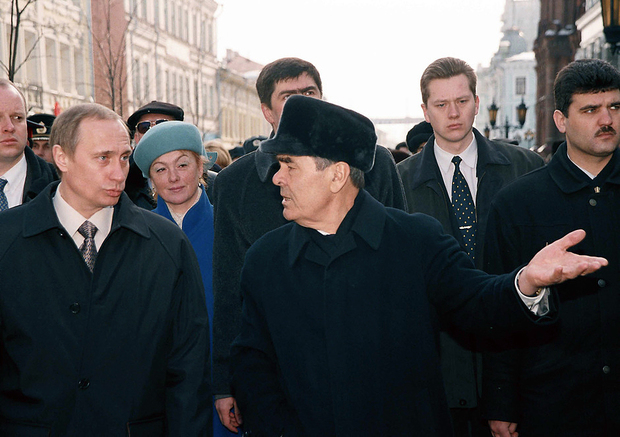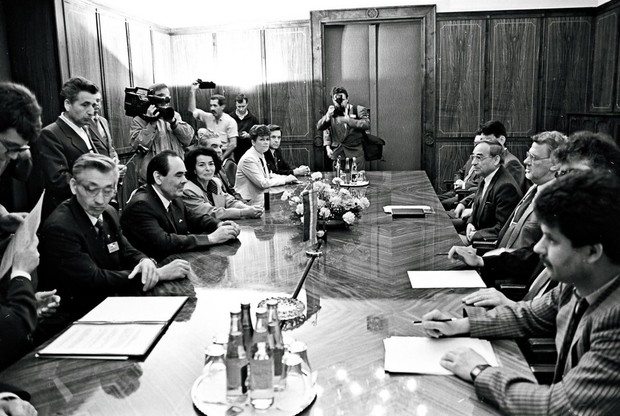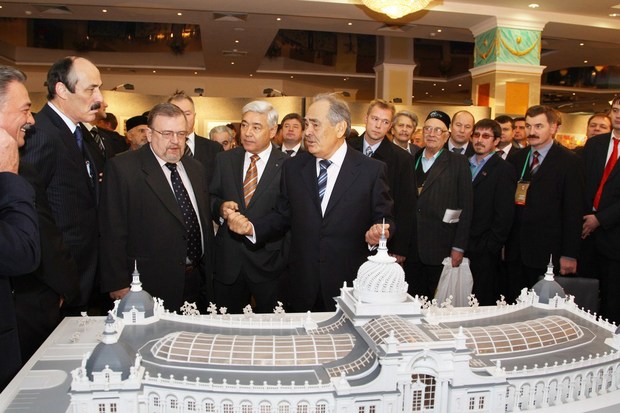Shaimiev’s lessons for Eurasia
What has the first President of Tatarstan contributed to Russia?
At the end of last month, the first President of Tatarstan, state adviser of the Republic Mintimer Shaimiev celebrated his 80th anniversary. A Kazan political scientist and economist Marat Khayrullin in his newspaper column, written specially for Realnoe Vremya, reflects on the contribution of Mintimer Shaimiev in the Russian federalism and the preservation of the integrity of the state.
Special present
The main political event of the beginning of the year in the Republic, without a doubt, was the 80-year anniversary of the first president of Tatarstan Mintimer Shaimiev. However, as it often happens with such events, the anniversary passed and the next day everyone forgot about it except the celebrant himself. But with this anniversary of Mintimer Shaimiev it was different.
As it is known, it culminated in the invitation of the first president of Tatarstan to the Kremlin for a meeting with two top leaders of the country — Vladimir Putin and Dmitry Medvedev, during the presidency of whom he has been the leader of the Republic for 10 years. But many were pleasantly surprised not so much by the format of this meeting at the highest level but by its content. In particular, the gift, the ancient map of Tartary by a Dutch cartographer of the seventeenth century Willem Blaeu, presented by the first head of state Vladimir Putin to Mintimer Shaimiev with the words of the common history of the Russians and the Tatars. In fact, this became the official recognition of the affinity of Russian-Tatar history and Eurasian nature of the Russian statehood. The Putin's words and the gift to the first President of our Republic are the highest mark of Shaimiev's work on the historic rehabilitation of the Tatar people and the preservation of the Russian-Tatar unity.
In this regard, the recent statement of the Minister of Culture of Russia Vladimir Medinsky about Putin's gift to Shaimiev that it should be treated with humour is puzzling. Does this mean that the honourable minister treats the Moscow Kremlin as a sort of theatre of satire, and the president and the prime minister of the country work as artists of the comic genre? Whether in this case their other statements and actions should be treated with humour? Perhaps, Mr Medinsky just overworked, confused the supervised sphere with the Kremlin policy and framed his immediate superiors in a very ugly way.
In this connection, I recalled Putin's words about Shaimiev that he said at his first visit to Tatarstan in 1999. In particular, he considers him as a ''patriot and statesman, one of the founding fathers of the modern Russian state''. He repeated it again in 2014 at a meeting with young people in Seliger, when to the list of patriots and statesmen Putin, in addition to Mintimer Shaimiev, attributed current President of the Republic Rustam Minnikhanov.

Russian-Tatar unity
In general, the above-mentioned meeting in the Kremlin confirmed the special role of Mintimer Shaimiev in the contemporary history of Russia. However, it is noteworthy that when they talk about the contribution of the first president of Tatarstan to the construction of the new Russian state, it is reduced solely to the fact that he prevented the collapse of the state. Politicians and experts from Moscow especially like to say about this.
This can be explained only by the fact that the possible collapse of Russia is indeed still a major nightmare for those who experienced the fall of the Soviet Union. Thus, it only confirms the correctness of Putin's famous words, with which even the liberals in the face of Svanidze unwittingly agree that the collapse of the Soviet Union was a geopolitical disaster. In fact, the contribution of Mintimer Shaimiev to the contemporary Russian history should be viewed much broader and, one might even say, in a different way. The same as the fact that he prevented the collapse of the country — it is only a one-day event, namely, on 15 February 1994 when they together with the first President of Russia Boris Yeltsin signed the historic agreement in 1994.
However, this treaty terminated more than ten years ago, the integrity of Russia is also no longer in danger. Nevertheless, they continue to honour and be thankful to the first president of Tatarstan at the highest political level, as well as among people. Because he did another really great thing — not only preserved but, most importantly, already as state counsellor and the chairman of Guardian Council of Fund Revival he continues to strengthen Russian-Tatar unity. The importance of maintaining trust and respect between the peoples of Russia is understood differently against the background of the Ukrainian tragedy. Because what is happening today in this once-glorious Soviet Republic is no longer a crisis but really a tragedy that moves steadily to its catastrophic end.
Reflecting on the reasons for this, one pays attention to the fact that then, together with the Soviet Union, the idea of internationalism has gone from our public life. Post-Soviet politicians, experts and journalists have overshadowed the importance of preserving and strengthening the unity of peoples of the country. Not to mention to take some real effort.
No matter whether we are talking about the unity of the peoples of Russia, the former Soviet Union or the whole world. Today, the trend is to argue over the fact that someone does not respect other as it should, to constantly focus on the problems that divide peoples rather than contribute to their unity. But we consider those who gather like in Ukraine at train stations for flash mobs to sing the once common Soviet song as desperately lunatic. Although it is only them who preserved sanity in the Ukrainian mess. Therefore, there is no Russian-Ukrainian unity today, as well as there is no Russian-Georgian unity. Although historically and culturally Russian, Ukrainians and Georgians were and still are close to each other.
Then why have Russian and Tatars, despite their difficult history and different religions, managed to maintain unity among themselves? What is the secret of the policy of Mintimer Shaimiev, who allowed to strengthen, first of all, the Russian-Tatar unity, and the unity of all of the peoples living in our Republic? What are the lessons it teaches people and leaders of Eurasia? Of course, under the Eurasia I understand, first of all, the post-Soviet space, occupying a large part of the Eurasian continent, the most cosmopolitan and the only positioning themselves in the current integration as the Eurasian Union.

The successes of Tatarstan are largely due to the very fact that, having different options for the development 25 years ago, even to the extent of independence, it chose a path of unity with Russia within the framework of the constitutional treaty relations
Lesson one
We recently passed the quarter-century anniversary of the collapse of the Soviet Union, and with hindsight, we can confidently say that the main error of the majority of the leaders of the former Union republics was a lack of understanding of the importance of creating a new equitable inter-state union between them. Real integration of post-Soviet countries and, therefore, the avoidance of wars between them, their common economic and social progress are possible only in case if it will be done on the basis of the principles and mechanisms of federalism in its different configurations, from the confederation to democratic federalism.
Well-known successes of Tatarstan headed by Mintimer Shaimiev are largely due to the very fact that, having different options for the development 25 years ago, even to the extent of independence, especially after the referendum in 1992, he chose a path of unity with Russia within the framework of the constitutional treaty relations and the desire to turn it into a genuinely democratic federation. Despite the fact that this path was bumpy, but only this way allows to avoid bloodshed, to establish mechanisms to unite the countries to solve common challenges facing them, as well as to deal with any contradictions between them. Therein lies the second lesson of Shaimiev for the republics of the Eurasian Union.
Lesson two
The second lesson of Mintimer Shaimiev is the strict compliance with the principle of equality of peoples of the Republic of Tatarstan. The experience shows that all nations and nationalities are very sensitive to this issue, up to a readiness to take up arms to achieve equality. The recent events related to Crimea and Donbas confirm this. This is always one of the main goals of almost any national liberation struggle, which had been in the history of the mankind. All multinational states are tested for the right to be democratic, based on respect for the principle of equality of the resident peoples of the state. This affects a political stability in these states, without which it is ultimately impossible to achieve economic and social well-being.
As the experience of post-Soviet countries and republics show, the most critical issue here is the equality in the linguistic sphere. Both from the point of view of state status to the languages of the major ethnic communities in these countries and of the creation of equal conditions for national minorities to preserve their native language and, therefore, its identity.
Thanks to the national policy laid down during the presidency of Shaimiev and steadily continued today by President Rustam Minnikhanov, Tatarstan has implemented both. We remember that in 1990, the state languages were declared the Russian and Tatar languages. The Assembly of peoples of Tatarstan was established to assist cultural and ethnic communities in the preservation of language and culture, of the represented ethnic groups. They periodically held congresses of the peoples of Tatarstan.

Lesson three
The Russians and Tatars have managed to preserve the unity because the awareness of their common history took over. Under the common history, it is understood not only past, but also just yesterday. Because from the point of view of today, yesterday is already history. But there is also understanding that the Russians and the Tatars are doing the common history today and they will do it tomorrow as well. If in many former Soviet republics public policy has become the almost complete rejection of the Soviet and earlier Imperial heritage, in Tatarstan thanks to Mintimer Shaimiev it was chosen the policy of finding a common in our history that unites the Russian and Tatar peoples and not divide them. This is his third lesson.
One can find a lot of examples of confirmation of that fact, but without a doubt, the most striking evidence of the awareness of their common history, an important symbol of Russian-Tatar unity was the joint work of representatives of different peoples in our Republic under the leadership of RT state counsellor Mintimer Shaimiev on the reconstruction of the ancient city of Bolgar and the island town of Sviyazhsk. This is an example of how to overcome mutual resentments of the past, to build, not to destroy the present in order to have the possibility to create joint great future. We would think that this was meant by the leaders of the Russian state at a meeting with first President of Tatarstan Mintimer Shaimiev, when congratulating him with his 80th birthday and paying tribute to his contribution to the common history of the Russians and the Tatars. Despite the desire of some federal officials to represent it as a joke.
***
In connection with the current attempts to create Eurasian Union, politicians and experts often complain that there is an acute lack of a common ideology, which would unite them. It's hard to argue. But such an ideology is laying on the surface if you look to the Tatarstan experience, those lessons of a genuine integration policy of the first President of Tatarstan Mintimer Shaimiev. Obviously, the future ideology of any interstate union should contain the ideas of federalism, the equality of the peoples of the state and recognition of their shared history.